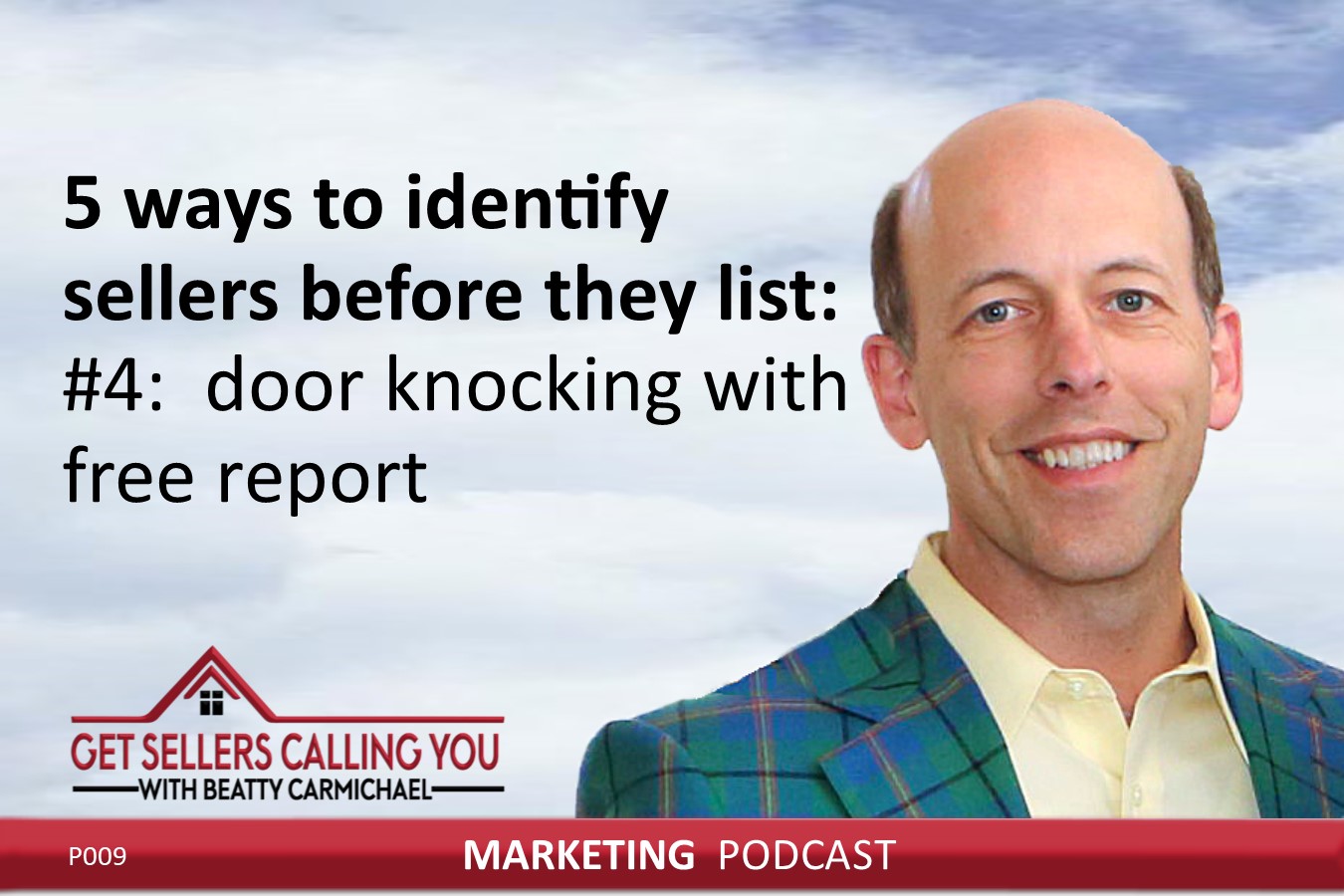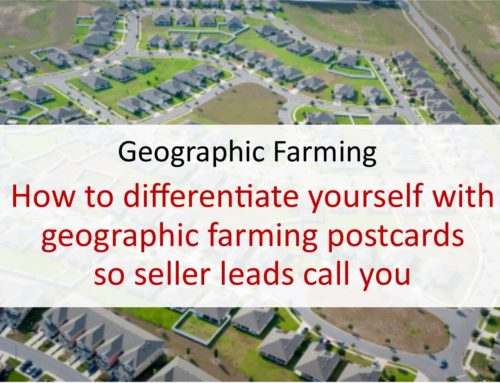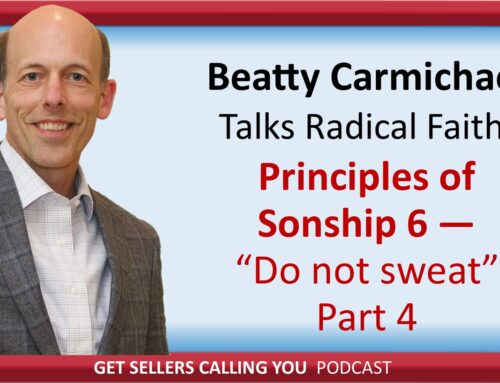Have Questions or Comments? Please ask your questions in the comments section below. We attempt to respond to ALL questions or comments.
Transcript:
Beatty: This is Get Sellers Calling You marketing podcast for real estate agents, and I’m Beatty Carmichael. For simple to do, proven marketing strategies focused exclusively on finding sellers and getting more listings, visit our website at getsellerscallingyou.com. And now, let’s begin our next session of Get Sellers Calling You.
Caroline: I’m Caroline [Springer 00:00:23]. Welcome to this is the next session of Get Sellers Calling You with Beatty Carmichael. Beatty is CEO of Master Grabber, the creator Agent Dominator, and he’s one of the top marketing experts in the real estate field. Today, we’re going to be continuing on. We’ve been going through the five ways to identify sellers. Today, we’re going to continue on with hopefully concepts four and five. We’re going to try to push them both in this one call. I don’t know, Beatty, would you like to do a quick refresher of those? Or you kind of want to just get started on our last two points?
Beatty: Let’s get started just so we don’t run out of time.
Caroline: Okay. That sounds great.
Beatty: Just as a little precursor on all of this, sometimes there are things that we all do on a day to day basis that we don’t realize that if we simply tweak them a little bit, then we can get tremendously more results. If you think about race car, this kind is kind of what I want to do with these next two topics for today’s call. Imagine, Caroline, that you and I get a race car kit, a NASCAR race car kit. You and your husband put yours together. I put mine together. Now, I’m assuming that you guys have never built a race car before. Is that correct? You’re not a mechanic or anything like that.
Caroline: No, we’re not mechanics, although it does sound fun to drive a race car.
Beatty: And I know what you’re thinking. Where in the world is Beatty going on this one? Well, so now, neither one of us are mechanics. Okay? And you build your car, I build mine, except I take mine down to a race car mechanic who puts all the finishing touches on it and tweaks it and makes all the settings just perfect. When we get out there on the race track, which of those two cars do you think is going to win? Yours or mine, that’s been tweaked?
Caroline: I would put my guess on yours, just because you’ve got some professional help there.
Beatty: There you go. So here’s what happens. We’re all going out there. We’re in this race called retail real estate sales. Okay? We’re racing down there. We’re doing all these activities as realtors. And yet, what we don’t realize is that we’re losing the race all the time because we simply do what everyone else does. There’s a fabulous book out there. If you like reading books, it’s called Rhinoceros Success. I think the guy’s name is Scott Alexander, the name that comes to mind quickly enough on that. The idea about Rhinoceros Success, as you look at what the crowds are doing, which he figuratively calls the herd of cattle, and then you do just the opposite, what he puts figuratively as the rhinoceros. And the rhinoceros will do whatever it takes to charge through the problem and conquer what he wants.
What happens is most realtors go through life and they do the same activities, and they do it the same way because that’s what they’ve been taught, because that’s the way all other realtors do it. But if you simply take the same activities and tweak them just a little bit, then at that point you can start to win at a level that you never imagined possible. And that’s what I want to do with these last two things that we’re going to talk about today.
The first thing is door knocking. Door knocking is used typically in geographic farming where you go and you door knock the neighborhood. Here’s a trivia question for you, Caroline. What is the purpose of door knocking? Why do you go door knock?
Caroline: I would assume to just have a personal connection and be able to introduce yourself, and also to give some materials about the services that you offer.
Beatty: Okay. So to make that personal connection. That’s the most important part. And what is the significance of a personal connection?
Caroline: Well, especially in today’s-
Beatty: Do you remember any statistics that may come along with that?
Caroline: Well, I know statistically that people have to hear from you six times before they refer to you or remember you on a first name basis. Things like that. That’s a separate statistic.
Beatty: That’s a good statistic. Before you answer further, let’s go back to that because this is all starting to move the direction I want this conversation to go. Saying how it’s going now, I think we might end up having to push our fifth topic into a fifth call, because this is going to be a good conversation so far.
So, 6 or 7 times, or 8 or 9 or 10 or 11 times, depending on what studies and what you’re doing, are the studies that say you have to touch a prospect before they start to recognize you and remember you. Right? That’s kind of basically what you just said.
Caroline: Correct. Yeah. What I read previously was six times.
Beatty: And I don’t think anyone has a corner on exactly how many numbers it is. I’ve seen it as high as 12, so we cut it somewhere in the middle and we’re going to somewhere between 6 and 12; probably 8 to 10. Okay? But here’s what all those studies and all those analyses are talking about. If you never meet hat prospect and all you’re doing is you’re touching them vicariously through some other means, a postcard, a radio ad, a TV ad, something in the mail, something in their email inbox, then it takes multiple, multiple, multiple touches before you remember who they are. Let me ask you a question. If you were to go meet someone at the mall and you had kind of a fun conversation with them, do you think you would have to meet them five or six additional times before you actually remember them? Or do you think you would remember them from that first meeting?
Caroline: Well you know, even you using the term “fun,” if there was some kind of connection, something, if we connected about our kids or maybe we go to the same church, or some kind of connection, I think it would not take me that many times to remember them or that conversation.
Beatty: Bingo. So here’s the reason why you door knock. It’s a fundamental marketing accomplishment. That is, if you were to door knock and meet someone in person at their door and visit with them for a few moments, you have now fast tracked all of those 6 or 8 or 10 or 12 touches that you have to do before they begin to even remember you. Not only do you fast track it, but you fast track in such a way that that one personal touch that you’re in front of them is going to be more significant in getting them to know you, trust you, like you, and remember you, than all of those 6 or 8 or 10 or 12 touches combined. In fact, studies have shown an analysis when people are doing marketing that simply having met somebody means that they are now 8 to 10 times more likely to do business with you than if you’d never met them, which is an amazing impact.
Now let’s put this in the context of real estate. Let’s put this in the context of, so you’re a realtor and you’re going to go out and you’re going to door knock. And the reason you’re going to door knock is, if you can meet those people and have that conversation and you leave that positive impression with you, they like you, they now put a name and a face and a personality to you, and they begin to trust you, then at that moment, they’re more likely to do business with you. All the additional touches then that you do that, an email, an online ad, a postcard, a flyer, or anything else, at that moment, now all those become personal communication from someone that they know, rather than simple advertising communication from someone they don’t know. And that’s a significant difference. Is this kind of taking shape for you?
Caroline: Absolutely. I think in today’s world, any kind of personal connection, whether it be that door knocking or even in the past you’ve mentioned, any time that you could, write anything with your own handwriting. Anything like that I think sticks out in today’s world, because people are so bombarded with mass emails and mass phone calls and things like that. So I think in today’s world, that really, really … that little bit of effort is going to stick out.
Beatty: It really does. And I’m glad you brought that up because in the old days as I was growing up, you would send handwritten notes. People would actually write a letter or pick up the phone and call. Now you send a short text or an email, and that’s about it. The whole formality, the whole personal touch has pretty much gone away. So by taking that little extra step, then you completely set yourself apart from the other agents out there. They start to get to know you, trust you. So that’s now the first step, door knocking.
Now let’s talk about, how do you tweak the door knocking to start to identify sellers? So let me see if I can set the stage for us real quick. So, we’re going to look at the crowd of agents and we’re going to do just the opposite. Here’s a question. Most realtors door knock a neighborhood or not. What do you think is the answer?
Caroline: I would say not, especially in the fact that I’ve lived in my house for four years and no one’s ever knocked on my door.
Beatty: Okay, great. So we’re going to take the path of least resistance, which is do what everyone else doesn’t do. This is Rhinoceros Success at its peak. So we’re going to become the rhinoceros rather than the cattle, okay? We’re going to set our business apart, and by doing it, we’re going to go door knock. And immediately, by going out and door knocking, I now have the competitive edge on the hundred other real estate agents that are all trying to sell into that area. That’s the first step I’m going to do.
But the second step is I’m going to do a few other things. Now, door knocking takes time and effort, and I get that. And if you door knock during the weekday, you’re probably not going to find many people, other than maybe stay at home moms. And I get that. So you have to work your door knocking within those hours that you’re more likely to find someone. After work. Saturday mornings. Sunday afternoons and evenings, or Sundays around the ball schedules basically and other things going on. So you’ve got to find the time, and it’s not convenient. I get that. But you know, success is never convenient either. It takes work.
So now we’re out there door knocking. Now the question is, how do we use this concept of door knocking to identify sellers? So if you’re the typical agent out there, not the interviewer who may look at my list and know what the secret process is, but if you’re that typical agent out there and you’re thinking that door knocking … if you haven’t seen the outline that I’m going to be talking about today, what do you think that typical agent’s going to think about, in terms of how do you identify a seller? How do you identify them? When I’m door knocking, how do I identify those people who are thinking about selling among those people who are not? What do you think the answer is?
Caroline: I would formulate my question when I’m introducing myself. Like you said in previous calls, just formulating a question about if they were thinking about selling any time soon, or if they’d be interested in learning about the value of their home. Or even just introducing myself as this neighborhood’s specialist. You used the Meadow Heights I think you said before. You know, “I’ve sold several homes in Meadow Heights. I feel like I know this area.” Or even offering that you might have some buyers that are looking for homes that are similar to theirs. I feel like that’s what I would try to work in some of the clever wording that you use on maybe your marketing postcards or in an email or on your website. I would try to maybe formulate, just have that be kind of in my bank of questions in my mind of something that I would want to flip into the conversation.
Beatty: Perfect. Now I want to reel you back even further. You haven’t heard any of my training before. You are the typical real estate agent out there, okay? So now, as a typical real estate agent, you’re out there door knocking and you’re thinking, oh, I might be able to find some sellers. What are you going to do to see if you find a seller or not?
Caroline: Let’s see. Typical untrained, un-Beatty trained realtor.
Beatty: Just think about the cattle. Moo. If you’re part of the cattle herd, what are you going to do?
Caroline: Probably introduce myself and then ask them if they were thinking about buying or selling. Maybe just that simple question.
Beatty: It’s that simple question. So here’s the challenge. Imagine now that you have this guy come and he’s knocking on your door, and you open. And he says, “Hi, I’m Beatty Carmichael. I’m a real estate agent in the area. I sell a lot of homes around the neighborhood. I was just introducing myself. I just wanted to find out if you guys might be thinking about buying or selling a home anytime soon.” What are you going to tell them?
Caroline: No. Because I truthfully am not. But even if I was, I think I would just say no because I don’t know them. Sometimes too I feel like to hold their cards to themselves, if you will. So I think I would probably just say no, even if I was thinking about selling soon.
Beatty: Yep, and there’s the problem. You’re going to say no, even though you’re actually thinking about selling, if you were. So now we’ve got this problem, and this is why most agents never really get over that hump and step up. Because they don’t know, what do I do? They never thought about it. And so the only thing they can think about is what every other agent does. “Well, are you thinking about buying or selling anytime soon, or know anyone who does?” And you think that simply because if you’ve taken the effort to go knock on the door and you’re being friendly, that they’re now going to automatically trust you and divulge the fact that they might be thinking about selling, when in reality, they don’t want you do know because they’re afraid that you’re going to come pester them and try to push them into listing it with you, or push them into trying to list it right now. So we have this natural tendency that we want to push back. We want to, as you said, hold our cards close to our chest. Because at this point, we don’t trust that person yet.
That’s the position that we find ourselves in. And so now, let’s tweak that just a little bit. With one simple tweak, I can identify sellers almost every single time. Would you like to guess what that tweak might be without reviewing or remembering what I put on the outline for this call?
Caroline: Let’s see.
Beatty: It’s an awkward question because you know the answer. Yeah. So let’s set the stage first, okay? So what we want to do is, anytime we’re trying to identify a seller, we always need to offer something that will entice them to respond without them really knowing that they’re letting us know that they’re planning to sell. That’s the idea. Because if they think about, “Oh I’m about to let this guy know I’m thinking about selling,” then at that point, everything changes because now they then hold those cards close to their chest. So what we have to do is we’ve got to create something that makes it interesting and simple for them to respond.
What I would do as an agent is I’m going to make a list of the most important things. I’m going to have a pretend phone call. I’m going to have one of my clients pretend to call me up. They say, “Hey Beatty, we really loved dealing with you about 8 or 10 years ago when we bought this home. Our family has grown and we’re thinking about up-sizing and selling our home and buying a new one. And we’re probably a couple months out before we do that, but I wanted to call you because I really trust you. I know you’re an expert in all of this stuff. What can we do with our home over the next couple months? What should we be doing or thinking about that will help us maximize how much money we’ll get for it, and be able to sell it in the shortest amount of time?” Would that be a fair question, Caroline, do you think, for someone to call and ask?
Caroline: Oh, absolutely. Especially if they, like you said, had already built a trust with you previously. I think absolutely.
Beatty: Yeah. Okay, so now imagine that that phone call comes to you as a real estate agent. Or, not you, Caroline, but you, the people listening to this call. And then, here’s the question. What would you tell them? If I called up and I said, “I’m one of your past clients. I love you. I’m going to sell my house through you. And I’m calling you up and saying, what are the top five things I ought to be doing or thinking about to ensure I get the most money for my home?” Whatever those things are, you make a list. Put them on a list, and you type this up, and then you give a description or instructions on each of them.
So let’s say one of them is obviously going to be, paint your house. Do you paint everything, or just parts of it? Well, what colors? Because 8 or 10 years ago, maybe the colors that really sold are different than the colors that are selling today. So what colors do I pick? What do I paint? What colors? Where do I paint? And whatever those instructions are, you put that down. And then maybe another thing is going to be, declutter. How do I declutter? What am I looking for? If I wanted to do it on my own, how would you describe in just a single, simple paragraph what the objective is of decluttering? What about all my personal items? I’ve got photos of the kids from little babies and gurgling all the way up to toddlers all the way to their first day in school, and they’re all over the house. Do I keep those out or do I hid them? Well, you know the answer. You hide those, all those personal effects, so that prospects coming through don’t feel like they’re violating someone’s private space.
What are the other things that you do? Maybe it’s 5, maybe it’s 8, maybe it’s 10, maybe it’s 12. Take a moment and actually make out a list of the most important things you can do in preparing the home before you put it on the market. Give a little description of each of those things so if you were to hand that to me as your past client, I could read it and know exactly what I’m to do. And it also shows off your expertise, does it not? Make sure you put your name and contact information. I would also put at the end of that a bio about you. Maybe a couple facts about you that most people don’t know to build that relationship, and a couple of expert facts about you that most people don’t know to build that perception of real estate expertise. So do you have this whole packet of information visualized in your mind, Caroline?
Caroline: Yes I do. I’m already thinking, if I was a realtor I would have stats about how fast my homes sell and things like that. I love it.
Beatty: There you go. Perfect. So now we put all that together and we put it in either a little binder, we staple it, we have it in a folder, we do it in a little booklet. Whatever you want to on that. And now we have tweaked our process. So now, watch this. I’m going to go out. I’m going to look at what most agents are doing, which is not door knocking, and so I’m going to start door knocking. And then, I’m going to do what most agents who door knock don’t do, because what they do is somewhat effective, but what they don’t do is where you’re missing the mark, and I’m going to have that piece of information with me. Now here’s the next question for you. Let’s see, because this wasn’t on my notes, so now this will be an honest question for you. So Caroline, I’ve got this packet of information. Do I carry it to the door with me or not?
Caroline: Honestly, I would think maybe not, just because you don’t want to seem like this is a sales presentation, you’re at the door, versus if the conversation just goes there organically, I think it would seem more natural to be like, “Hey I’ve got this report in my car.” That would just be my first thought.
Beatty: Okay well that’s actually a good thought. I did look at my notes and it was in my notes, but obviously you came up with your own idea on why, and I like that. So you don’t carry it to the door. I love the reason why you suggest, because it then seems a little bit more salesy, and you’re absolutely correct. I was going to leave it in the car for a different reason. I think it’s all kind of part of the same. That is, if you leave it in the car, then as you’re door knocking out there and you’re just meeting people, you’re just a friend. Make sure, by the way, if you door knock, wear a name tag. Because when I say my name is Beatty Carmichael, which is not a normal name, people aren’t going to remember it. They’re not even going to know what I said. But if I have my name tag on that spelled it out, here’s what’s interesting.
If you introduce yourself with your name and there is a name tag that has it spelled out so someone can actually see it with their eyes as they’re hearing it with their ears, it makes a more indelible impression and they remember it better. So you want them to remember your name, so wear your name tag. And I might even say, “Hey, I’m Beatty Carmichael and here’s my name tag to prove it.” Okay? So now I’m going to force your eyes to my name tag and you’re going to see it, and that’s just going to be a little way to impress upon you so that you don’t forget my name.
So I’m going to introduce myself. I’m going to be happy. I’m not going to be doing anything about asking, are you going to buy or sell. Because that’s what they think you’re going to do, and I’m not going to do any of that because I don’t want to be pushy. People don’t trust people that come across pushy. All I am there to do is to build a relationship, to say hello, and I might say something like, “Hey I drive this red Suburban” or whatever my car is, “and so if you see me, be sure to wave and let me know … because I’m out here all the time. I’d love to just keep in touch.” And, “I see you’ve got play toys all over. You got little kids? I got three little kids myself.” Do something to build a relationship, sort of like what you said. If you start talking about kids, you’re probably going to remember them more because that’s real central in your life. So as I’m door knocking, I want to find something about their home, about their life, about what I see inside, about anything that I can then try to relate to.
Here’s something real interesting about relationships. Relationships are tied on commonality. The more I have in common with someone, the more likely they are to like me. So if I can find something quickly in that conversation that I can then tie a commonality to, then it’s going to tie together.
But here’s the sitch. Here’s where the rub now meets in identifying sellers. I’m going to spend just a few moments talking with you, visiting. Nothing about trying to sell your house or anything along those lines. And then I’m going to turn to walk away. “Hey, it’s great meeting you, Caroline. Thank you so much for answering the door. If I can be of any service, in fact, here’s my business card. If I can be of any service at any time with any real estate questions, please let me know.” And you go, “Okay, great. I will.” And I’m turning away. And just before you close the door, I’m going to stop and say, “Oh, one more thing. It just hit me. I don’t know, I put together some information for one of my clients a while back on what to do to prepare your home if you’re thinking about selling it. Because I found that there’s probably five or eight things that are the most important things that, if you do, you’ll end up getting the most money for your home if you do it before you get it on the market. I’ve got an extra copy in my car. Would you guys have any interest in that? I’d love it grab it and leave it with you if you are.” So by simply offering it, only the person who’s thinking about selling would accept it.
So now let me go back and ask you. I come to your door. We’ve never met. I talk with you a little bit. I see you’ve got a little baby in your arms and I talk about when ours were little babies at that same age, and we just kind of talk kid stuff a little bit. I gave you my card. If you have any questions or anything, I can help you with real estate. Let me know. I’m about to leave, and then I stop in my tracks. I turn back around, and I say, “Oh by the way.” And I let you know that I’ve got this information in the car on the most important things to do to get your home ready to go on the market. Would you have any interest in me leaving that with you? At that point, if you guys were thinking about selling in the near future, do you think you would ask me to leave it with you?
Caroline: Absolutely, especially after that personal connection. I think you naturally build trust with people based on things you have in common and you start to see yourself in them and things like that. So you already have this kind of foundation building of trust. And then they’re connecting to something that you actually are doing, like you’re thinking about, and then that perks your interest. And so you would probably value what they’re offering and think it’s trustworthy.
Beatty: Let me go back to … Okay. The first time, I come up, I start talking with you, and then I ask you, “Hey are you guys thinking about buying or selling a home anytime soon? Or are you thinking about selling your home anytime soon?” You’re going to be reticent to tell me yes, even if you’re thinking you are, because it’s a little forward approach. Right?
Caroline: Right.
Beatty: But if I let you know I put this stuff together for a client of mine, I actually have an extra copy in the car, I’d love to leave it with you if you have interest in it. Would you have interest in that? Are you, at that point, a lot more likely to say you have interest in it, more so than you would to tell me you’re thinking about selling.
Caroline: Absolutely too because I think that still feels safe, you know?
Beatty: That’s it. It feels safe. And so this is that one little tweak that will identify almost every single person you talk to. And you can use it not only at door knocking but just anyone you meet. You know, hey, you meet someone on the streets and you start talking and say, “Hey by the way, I don’t know if you have an interest in this. I’ve got this extra copy of this report I did for a client of mine in the car on how to best get your home on the market. Would you like a copy of that?” Anytime you use that, what you’re doing is you’re offering something that only a seller would be interested in that a non-seller would not, and it’s an easy way to identify who’s thinking about selling. And they don’t even realize that they’re identifying themselves as such. Isn’t that cool?
Caroline: It is. That’s why I love all your little … even like a tweak in the way that you word something, or a tweak in a way that you approach something or deliver it, it’s going to give you a lot more information that you might have even first realized. That seems like it’s the key.
I think we are about out of time and we’ll need to wrap it up. We kind of went a little over, but that’s okay. I think it was great to finish. I thought that was a great dialogue and some really great explanation and content behind that. So we will be continuing into our final call of this series for Get Sellers Calling You, the Five Ways to Identify Sellers. Our last call will be next week. Thank you Beatty so much for your time and expertise today. I think this was a really great call.
Beatty: Well thank you. I think it was, and we’ll end up doing the fifth item next week obviously.
Caroline: I know you’ve spoken a little bit about your expertise and how you would approach things. Was there anything in your services that would kind of line up with this that you offer that you’d like to share about?
Beatty: Well you know, the main thing we do, as you know, is we have a service that we call Agent Dominator. Agent Dominator is really the culmination of all the things that we do and all these ideas, and creating a system that makes it easy for someone to go out and target a personal list, like a past clients and sphere of influence, or a geographic list, or anything like that, with a focus of either identifying sellers out of that list and/or converting them to actual listings. You can see it at agentdominator.net. I’d love for you to go check it out if you have an interest with that. And then obviously, with what we’re doing here, these are a lot of secrets that you can do on your own without even using a service like ours. Ours just kind of super charges everything. So I appreciate the opportunity for that little plug.
Caroline: Of course. Yeah, I like the word super charge. That’s a good description for it. What we’re going to do is we’re going to wrap up the call. And for those of you that are live on this call, if you have questions you’d like to ask Beatty, just hold on and as soon as we’re wrapped up, we’re going to go into a short question and answer time. We do have the lines muted, so in just a moment we will unmute them. I think that’s it for today. Thanks, everyone, for joining in.
Beatty: If you enjoy this podcast, please tell others about it. Also, be sure to get our step-by-step training on how to double sales and referrals from past clients and sphere of influence. It’s absolutely the easiest way to grow your business fast. And it’s completely free. You’ll find it on our website at getsellerscallingyou.com. Thanks for listening.
P009








Leave A Comment